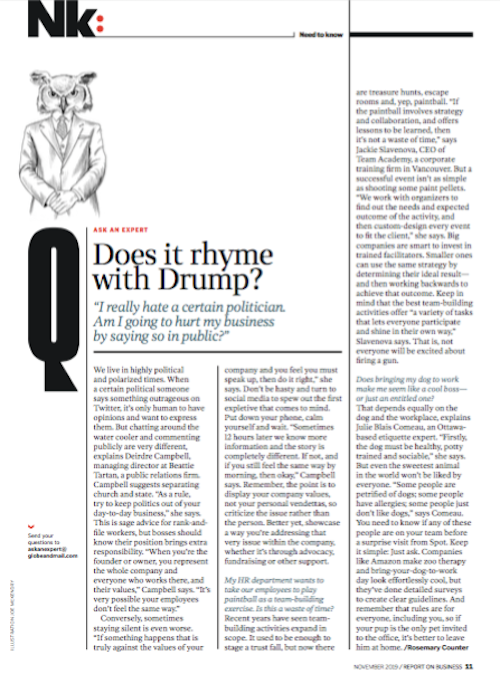Does it rhyme with Drump?
Report on Business: Ask an Expert
I really hate a certain politician. Am I going to hurt my business by saying so in public?
We live in highly political and polarized times. When a certain political someone says something outrageous on Twitter, it’s only human to have opinions and want to express them. But chatting around the water cooler and commenting publicly are very different, explains Deirdre Campbell, managing director at Beattie Tartan, a public relations firm. Campbell suggests separating church and state. “As a rule, try to keep politics out of your day-to-day business,” she says. This is sage advice for rank-and-file workers, but bosses should know their position brings extra responsibility. “When you’re the founder or owner, you represent the whole company and everyone who works there, and their values,” Campbell says. “It’s very possible your employees don’t feel the same way.”
Conversely, sometimes staying silent is even worse. “If something happens that is truly against the values of your company and you feel you must speak up, then do it right,” she says. Don’t be hasty and turn to social media to spew out the first expletive that comes to mind. Put down your phone, calm yourself and wait. “Sometimes 12 hours later we know more information and the story is completely different. If not, and if you still feel the same way by morning, then okay,” Campbell says. Remember, the point is to display your company values, not your personal vendettas, so criticize the issue rather than the person. Better yet, showcase a way you’re addressing that very issue within the company, whether it’s through advocacy, fundraising or other support.
My HR department wants to take our employees to play paintball as a team-building exercise. Is this a waste of time?
Recent years have seen team-building activities expand in scope. It used to be enough to stage a trust fall, but now there are treasure hunts, escape rooms and, yep, paintball. “If the paintball involves strategy and collaboration, and offers lessons to be learned, then it’s not a waste of time,” says Jackie Slavenova, CEO of Team Academy, a corporate training rm in Vancouver. But a successful event isn’t as simple as shooting some paint pellets. “We work with organizers to find out the needs and expected outcome of the activity, and then custom-design every event to fit the client,” she says. Big companies are smart to invest in trained facilitators. Smaller ones can use the same strategy by determining their ideal result—and then working backwards to achieve that outcome. Keep in mind that the best team-building activities offer “a variety of tasks that lets everyone participate and shine in their own way,” Slavenova says. That is, not everyone will be excited about firing a gun.
Does bringing my dog to work make me seem like a cool boss—or just an entitled one?
That depends equally on the dog and the workplace, explains Julie Blais Comeau, an Ottawa-based etiquette expert. “Firstly, the dog must be healthy, potty trained and sociable,” she says. But even the sweetest animal in the world won’t be liked by everyone. “Some people are petrified of dogs; some people have allergies; some people just don’t like dogs,” says Comeau. You need to know if any of these people are on your team before a surprise visit from Spot. Keep it simple: Just ask. Companies like Amazon make zoo therapy and bring-your-dog-to-work day look effortlessly cool, but they’ve done detailed surveys to create clear guidelines. And remember that rules are for everyone, including you, so if your pup is the only pet invited to the office, it’s better to leave him at home.
